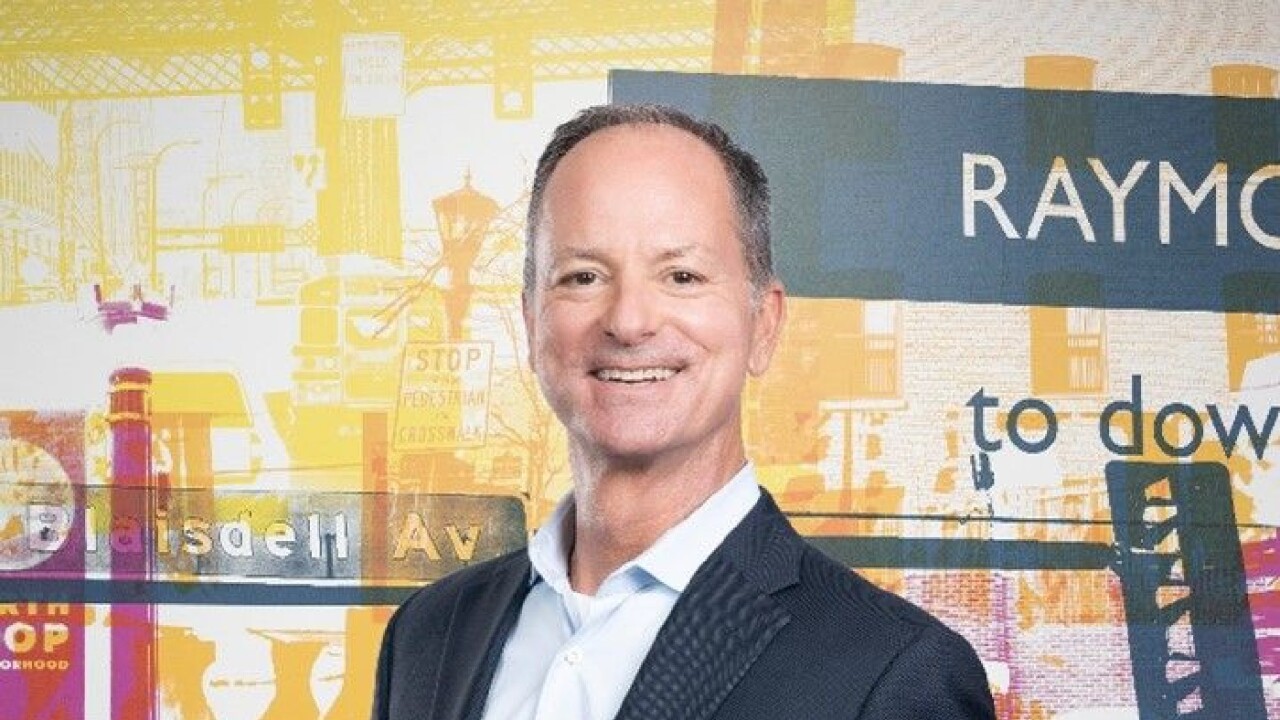
Set up a Google Meet with Trevor Gauthier, and you will get a glimpse into an inviting home office, with a black Lab napping in the window seat and a Swiss mountain dog on the floor.
Gauthier is CEO of Aces Quality Management, a Denver-based fintech where 100% of employees work remotely. The company develops auditing software for banks' lending, call monitoring, wealth management and "anything they have a checklist against."
The fintech exemplifies a trend among the companies on this year's list of the
Fintech leaders and staffing experts say the policies give them an edge in attracting and retaining top tech talent during a time when big banks are moving in the opposite direction.
"It's an added benefit that allows us to compete with the largest tech companies in the United States," Gauthier said.
"We hear it regularly, when folks come in for interviews, that one of the reasons they wanted to come in was the flexibility of the work schedule and the ability to work remotely," Gauthier said. "Remote work is really important to a lot of people, especially folks that got used to it [during the pandemic], and they don't want to go back. As someone who went into an office for the large majority of my career, it's nice to have that hour, hour and a half back in life, whether it's to work or to do other things. I don't need to be spending my time in a car or a train."
Remote work allows Aces to recruit nationwide. "It doesn't matter if you're in Arkansas, it doesn't matter if you're anywhere," Gauthier said. "We don't have to fill seats."
The company has recruited experienced people from large, Fortune 500 companies and big tech firms, he said.
White Clay, a Louisville, Kentucky-based provider of analytics to help banks with profitability, pricing and deepening relationships, has also seen such benefits.
"It's probably more of … not having [a] disadvantage than having it is an advantage," CEO Mac Thompson told American Banker.
When Chicago-based Advyzon, a provider of customer experience software, recently hired a new team member, "she discovered one of her parents had terminal cancer and the immediate reaction was she was going to have to resign, because her previous employer had been so rigid," said Samantha Schwimmer, chief marketing officer. "We found a schedule that worked for everyone and she has recognized that we helped her navigate a very difficult time."
Offering work-from-home flexibility "absolutely" gives companies an edge in recruiting for banking jobs, said Steve Saah, executive director at the staffing and recruiting firm Robert Half.
"The more flexibility you offer people, the bigger pool of talent that you have access to," Saah told American Banker. "If people have to commute to an office five days a week, that's going to put a certain set of parameters on individuals. If you open that up by saying that a person only needs to come in three or four or two days a week now, all of a sudden you're going to open yourself up to a bigger pool of talent."
Companies that suddenly mandate a return-to-office policy risk losing the institutional knowledge that people who have been in the organization for a while have accumulated.
Saah recommends looking at each employee's situation individually — considering their tenure, with whom they need to work, their role and their training needs to determine the right mix of in-office work.
Making everyone come to the office on set days is easy to manage, but not necessarily the best setup for an organization, Saah said.
"There are certain roles where you do physically have to be in the office," he said. "There are other roles where maybe you don't ever need to be in the office, and some balance between those two extremes is going to work well for most of the people, most of the time. What people will push back on is a rigid mandate."
How fintechs do it
Aces does use shared office space in Denver where members of its finance team work at times. But the company isn't tied to a commercial lease. The expense that would have gone into leasing and maintaining office space can be invested in employees.
Aces' staff use a lot of collaborative tools, including Slack, Atlassian Jira and Microsoft Sharepoint. It has a "fun committee" that arranges games, coffee breaks and other get-togethers over video. The company brings all of its staffers together for some meetings.
Gauthier sees employees as more effective and productive when they work from home. In fact, he sometimes sees people working too much and tells them to pull back.
"I think it's harder sometimes for folks to disconnect when everything's in their house," he said. And though the company offers unlimited paid time off, "we have far more people that are not taking enough PTO. So we try to enforce a rule of: Take a week a quarter."
Robert Half surveys have found that people who work remotely or have hybrid work schedules actually work more hours, but the flexibility and autonomy that comes with that arrangement allows employees to have more balance in their personal lives, Saah said.
Letting people work from home has worked well for Aces.
"I don't see us going back," Gauthier said. "It's nice to have the flexibility that we have."
White Clay has office space, but it offers staff flexibility in how much they come in.
"It is guided more by what they do, rather than some sort of theoretical thought process that everyone should be in the office," CEO Thompson said.
At a New York Fintech Week event, speakers urged fintechs to better understand the criminal mindset and to use artificial intelligence to detect and thwart fraud.
Client management teams that serve the company's largest bank clients tend to come into the office more often because they need to collaborate.
"We don't really have rules around it, it's what makes sense to deliver what we need to from a client experience perspective," Thompson said.
Some employees were more productive when the company was almost fully remote during the pandemic shutdown, he said.
"There are a lot of personal flexibilities you pick up on on a personal level," Thompson said. "But collaboration and communication became more difficult. There are trade-offs, and you've got to figure out how to balance that out appropriately."
At White Clay, some employees' schedules vary week to week, depending on what they're working on.
"At the end of the day, the clients have got to have a great experience, and we've got to be efficient about what we do, because we're in a competitive market," Thompson said.
Big banks' return-to-office mandates
In a February town hall, JPMorganChase CEO Jamie Dimon gave an expletive-laden critique of remote work.
"The young generation is being damaged by this," he said. "They're being left behind socially, ideas, meeting people."
Internal Zoom meetings are also problematic, he said.
"A lot of you were on the [expletive] Zoom … and you were doing the following: looking at your mail, sending texts to each other about what an a— the other person is, not paying attention, not reading your stuff, and if you don't think that slows down efficiency, creativity, creates rudeness — it does," Dimon said. JPMorganChase, Goldman Sachs and Morgan Stanley are among the large banks that have implemented a five-day in-office mandate.
Thompson, the White Clay CEO, thinks Dimon has a point.
"It's really hard for people to learn banking, grow, interact. All those things are true statements," Thompson said. "But there's also times where you don't have to be in the office 40 hours a week to necessarily get to that point."
He agrees that collaboration works better when employees work together in person, including on software development.
"It's not merely doing steps one through 40 on the project plan list," Thompson said. "It is actually understanding why, the meaning of what we're doing and how it's going to impact our users' lives and their clients lives, and I think that requires some interaction."
At the same time, most people want to be able to work from home a couple of days a week, he said.
At Aces, most employees are experienced, so there isn't a need to bring along young employees, Gauthier said.
Robert Half research shows a broad dichotomy between what employers and employees are seeking in terms of where people do their work.
About 69% of employees in finance and accounting want to work in the office three days a week or less, the company's 2025 salary guide found. But another Robert Half study analyzed all job postings and found that about 59% of finance and accounting positions were fully in office, while 25% were hybrid, and only 16% were fully remote. And in unpublished research the company conducted, 59% of finance and accounting workers said they will only consider positions that offer flexible work options when job searching (either fully remote or hybrid).
"A number of large organizations have implemented return-to-office policies, and they cite things like the need for people to collaborate, to connect with one another, learn together and continue to maintain the corporate culture," Saah said. "More companies would like to have people in the office a bit more often than they currently do. That doesn't necessarily mean it's nine to five, or five days a week. But the flip side of that is the majority of people do not want to be wedded to a strict schedule, whereby they need to be in the office either every day or even on a rigid schedule, no matter what those days are."
In Robert Half's placements of employees, the firm consistently hears that people want autonomy and flexibility in where and when they work, he said. That includes both flexible schedules and "windowed work," or structuring a workday into distinct blocks of time for work activities and personal time.
"It remains a very, very, very competitive labor market, with the unemployment rate in accounting and finance somewhere between 1% and 2%," Saah said. "Individuals have a lot of choices on where they work, especially in accounting, finance and fintech."






